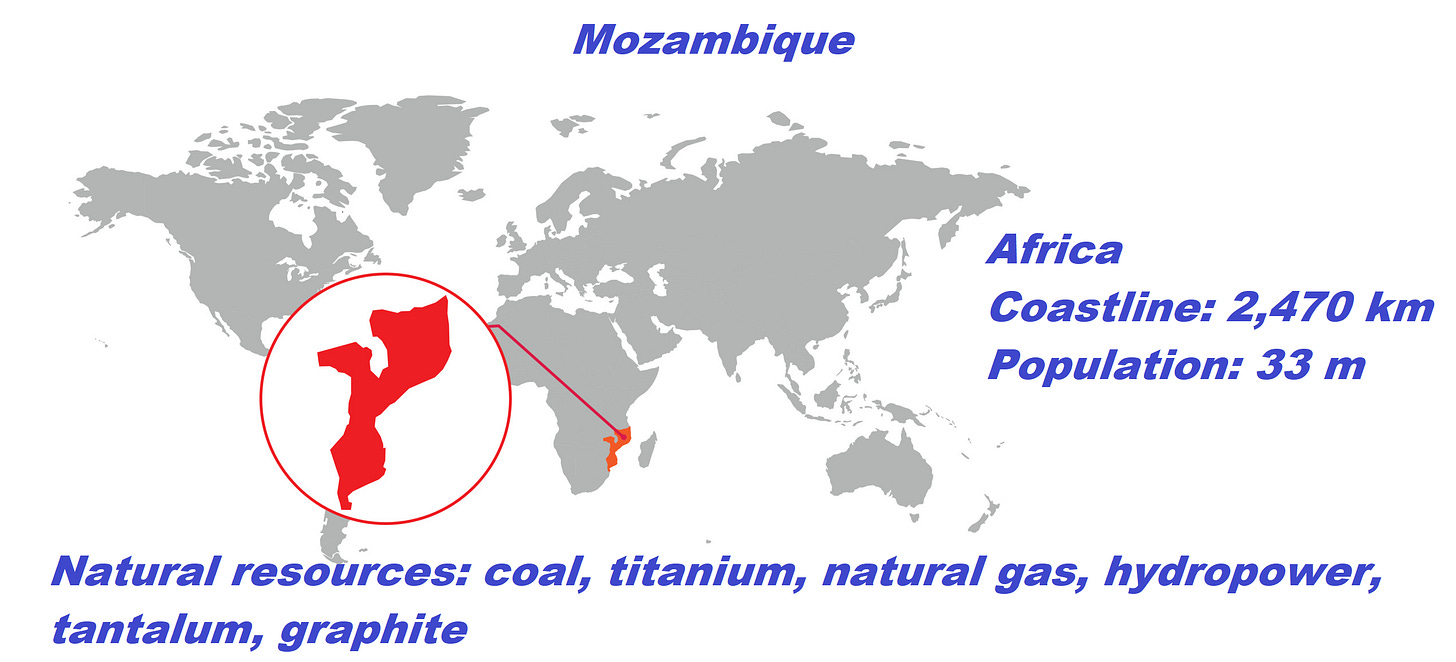No one threw USAID into the woodchipper; they handed America's future to China on a silver platter.
The details keep tumbling out.
Sweetener after sweetener after sweetener.
I’ve seen people bend over backwards, but this? This is the first time I’ve seen someone balancing on a single hand, twisting and flipping just to impress. China has pulled every trick in the book—and probably plenty that aren’t even written—to pull this little-known African country into its orbit.
$88 million for a bridge? Done.
Over $100 million in debt? Wiped clean.
Direct economic assistance? Hand-delivered.
Low tariffs? Forget that—let’s do zero tariffs on 98% of Mozambican exports to China.
Holy hell. Looking at all this effort, you’d think China already had Mozambique in its pocket. But not yet. Not until January 2025. Not until Elon Musk dropped the axe on USAID. That’s when China will finally start reaping the benefits of its years-long courtship of Mozambique.
But Mozambique has a history—a history where, when AIDS threatened to unravel the country into non-existence, it was the United States that stood shoulder to shoulder with her.
In 2003, the U.S. launched the President's Emergency Plan for AIDS Relief (PEPFAR), a global initiative to fight HIV/AIDS. Mozambique was one of 15 priority countries that received the bulk of the funding. Since then, PEPFAR and USAID have remained the United States' primary tools for supporting Mozambique, a nation of 33.9 million.

In 2023, USAID—both directly and through its partners—delivered nearly half a billion dollars in aid to Mozambique. That’s close to 10% of the country’s annual budget. Pull the plug on that, and you open Pandora’s box, especially for a nation that has depended on U.S. support for nearly two decades.
"Who cares about Mozambique? They need to fend for themselves!"
Don’t worry, MAGAts—China will be more than happy to step into the vacuum left by Elon Musk. And let’s be clear: all that U.S. aid wasn’t wasted. That goodwill turned into strategic influence, a bonanza that the United States is now throwing away.
Anadarko Petroleum, an American company, is pouring $20 billion into an LNG project in Mozambique’s Rovuma Basin, building a plant with a capacity of 12.9 million tonnes per year.
ExxonMobil isn’t far behind. Their Rovuma Basin project is set to produce 18 million tonnes of LNG annually—and that’s just the beginning. The real prize? 85 trillion cubic feet of natural gas in Area 4, according to Exxon’s own press release.
There’s a fortune sitting in Mozambican waters. The question is—who will control it?
With a country rich in natural resources, how on earth could Russian President Vladimir Putin resist dipping his hand into it? Of course, he did.
After securing control in Syria, Russia steadily expanded its influence across Africa—and Mozambique was no exception. They moved in, stirring instability. But the United States, alongside EU nations, stepped in to support the Mozambican government in counterterrorism efforts. It worked.
By 2019, Wagner was out.
Thankfully, Russia’s position has been severely weakened by the war in Ukraine. But make no mistake—if Putin secures a ceasefire, he will do everything in his power to reassert control in Syria. And once he’s back in Syria, Mozambique will be next.
Remember, there’s no U.S. foreign assistance.
Remember, there’s no USAID.
Remember, Mozambique is a poor country, with U.S. aid accounting for nearly 10% of its national budget. Take that away, and the country will already be in trouble. And Putin thrives on trouble.
So how exactly does the United States plan to protect its investments in the region? How does the so-called genius of the 21st century, Elon Musk, intend to secure the 30-million-tonne LNG production capacity? Maybe these American companies should just sell their stakes to the Chinese. At least China is still providing foreign aid to Mozambique. Maybe soon they’ll rebrand it ChinaAID—and Musk can help them promote it to the world.
I won’t blame Mozambique for taking China’s help. They should. They should ask the EU. They should take whatever assistance is available to fill the vacuum left by the United States.
The vacuum created by Elon Musk.
USAID is the tool America uses to keep the world stable and in return, as we have seen in the case of Mozambique, that stability translates into strategic influence, economic leverage, and access to critical resources. Cut it off, and the United States doesn’t just abandon a partner—it surrenders the playing field. And in Mozambique, that field is rich with natural gas, geopolitical positioning, and a history of goodwill that is now up for grabs.
China knows this. Russia knows this. And soon, the United States will learn the hard way that power isn’t just about military strength or corporate investments—it’s about presence.
And right now, America is walking away because of one man—whose interests may or may not align with those of the average American.
Next up: USAID impact on Syria and American interests in the middle-east







This is a brilliant analysis and example of what happens when decisions are made by ill considered whim. Experienced foreign policy hands know that “soft power” is incredibly effective and influential and, most importantly, durable. “Hard power” in the form of very expensive military intervention, either directly or indirectly, creates resentment and enmity both of which last for generations.
This is the long term implications of hiring people without experience to a job they are not qualified for.
The best parallel arguments I can make is that if you made a fortune as a proctologist, it does not make you a brain surgeon……or just because you cut limbs off a tree does not make you a horticulturalist.